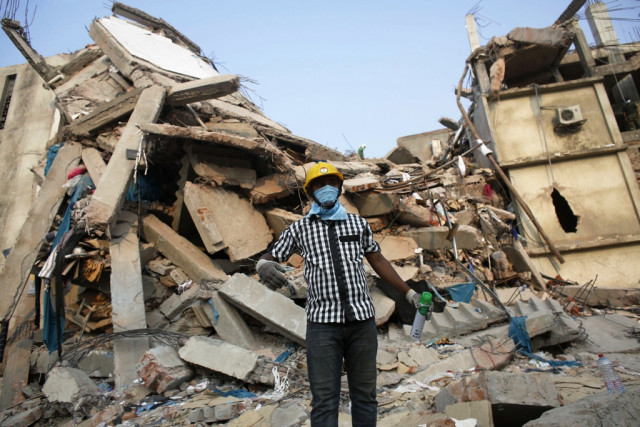Bangladesh volunteers haunted by rescue trauma
Mohammed Badal, who pulled 18 of his fellow textile workers from the ruins, also struggles to sleep.

A rescue worker stands in front of the rubble of the collapsed Rana Plaza building, in Savar, 30 km (19 miles) outside Dhaka April 26, 2013. PHOTO: REUTERS
"I had never even touched the hand of a woman before but it was the only way to save her and the others," said the 22-year-old in an interview ahead of the one-month anniversary of the disaster.
"My hand was soaked in blood by the end and I still can't get that image out of my head."
A total of 1,127 people died when the nine-storey building collapsed on the morning of April 24 in Savar, a suburb of the capital Dhaka, making it one of the deadliest industrial disasters of all time.
But the tragedy took its toll on others, including an army of volunteers who rescued hundreds but also encountered unimaginable horrors such as bodies decayed beyond identity.
Many of the hundreds of volunteers who spent nearly three weeks sifting through the ruins have reported similar signs of trauma as that experienced by Mamun, who like many Bangladeshis only uses one name.
Mamun, a part-time tailor, risked his life to crawl through a hole to reach three women on the second day of the rescue effort, only to find that a hand of one of them was encased in concrete and she was blocking access to the others.
"She was pleading to me: 'Please cut my hand'. There was no anaesthetic so I borrowed a hacksaw from the army," he said.
The army says at least 2,438 people - mostly female garment workers - were rescued, including 968 people who were seriously injured. Many of them had limbs amputated either at the site or in hospital.
The scale of the disaster meant students at a medical college next to the local Enam Hospital had to carry out some of the amputations. Sometimes the operations were done without anaesthetic and howls of agony echoed around the hospital.
The hospital says it has treated around 60 volunteers for trauma, including several medical students.
Trainee doctor Sushmita Nargis said she has been taking anti-anxiety tablets as she tries to cope with the memories.
"At one stage it felt as if the only sound I could hear in my head was of ambulance sirens. They just wouldn't stop," said Nargis.
"And then there were those heart-wrenching cries of the amputees and their relatives... How are you meant to feel when hundreds of patients lie all around you, crying and writhing in pain?"
The volunteers included students, street hawkers and housewives as well as garment workers who were the first on the scene.
Sometimes armed with little more than hammers or shovels, they proceeded to pull out hundreds of survivors whom they could see or hear crying out for help.
Others clubbed together to buy specialist drilling equipment.
The Bangladeshi government shunned offers from the United Nations and elsewhere for specialist help, leaving the army to coordinate the rescue effort.
As the days went by, the numbers of survivors fell away and the overwhelming memories that linger for the volunteers are the sights and smells of rotting corpses.
Even when the volunteers did manage to locate survivors, they were sometimes unable to bring them to safety as they were trapped by the debris.
Asma Akter Liza, who donated money to buy a drill after selling some of her books and clothes, fought back tears as she recalled the death of one young woman.
"I came across a girl called Bakul and she held out her hand to me from a tiny hole in the rubble," said the 28-year-old housewife.
"I held her hand for hours and we talked about everything. She called me sister.
"But in the end we could not save her. She was stuck in such a tiny pocket that it was impossible.
"These days her eyes, her cries for help haunt me all the time. Sometimes I can't control my tears."
The trauma has prompted many volunteers to seek counselling or medication as they seek to blot out the memories.
"Every time I go to bed, it feels like I'm in a dark place from where I can't escape," said Mamun.
"I thought of going to a mental hospital, but I don't have enough money."
Mohammed Badal, who pulled 18 of his fellow textile workers from the ruins, also struggles to sleep.
"Whenever I try to sleep, I end up hearing them crying out to me: 'Please save me brother, please save me brother'," said the 25-year-old.
"I sometimes even hear the cries in the daytime."



















COMMENTS
Comments are moderated and generally will be posted if they are on-topic and not abusive.
For more information, please see our Comments FAQ